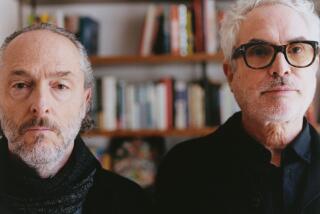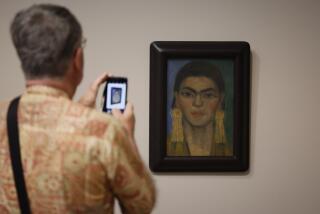The revolutionâs loyal photographer
One of the most famous photographs of the 20th century is of Ernesto âCheâ Guevara, wearing a military beret over his handsome face, framed by long curls. His gaze has been called pensive, angry, defiant or militant. When the revolutionary leader was captured and killed in Bolivia in 1967 the image became a ubiquitous icon, reproduced on T-shirts, posters and countless other items.
The photographer who took the picture, Alberto Diaz Gutierrez, known professionally as Alberto Korda or simply Korda, was not widely known until the late 1990s, when he successfully sued a British advertising agency for using his Guevara image without permission in a vodka campaign. It was in 1998 when filmmaker Hector Cruz Sandoval went to Cuba to shoot Pope John Paul IIâs visit that he was introduced to Korda, which led to a friendship and to Sandovalâs âKordaVision: A Cuban Revelation,â a well-crafted, affectionate but somewhat superficial portrait of the charismatic artist. Born in 1928, Korda, who became a top fashion photographer in the â50s and adopted his name from famed filmmakers Alexander and Zoltan Korda, would commit himself wholeheartedly to the Cuban revolution and to Fidel Castro, becoming Castroâs personal photographer from 1959 to 1968, after which he devoted himself to scientific underwater photography.
Handsome, with a distinguished-looking silver beard, Korda emerges as a world-class charmer with a keen appreciation of beautiful women. Sandoval follows Korda to the site of his â50s studio and other key locations in his career, shows him in a Chicago art gallery, where a retrospective of his work is on display and arranges a reunion with Castro and with other major photographers of the revolution. There is of course more to the story -- that like any other art form photography is selective, and that the photographs taken by Korda and his colleagues were shot by men committed to the revolution -- but Sandoval chooses not to explore further. Surely, someone as thoughtful as Korda would have held some opinions beyond the negative image he felt Castro and Cuba received in the American press. What did Korda think would happen to Cuba after Castro? As an artist how did he feel about freedom of expression in Cuba? How had he changed over the last 40 years? The answers to a few straightforward questions might have added depth.
With its beguiling subject and his historic work, âKordaVision: A Cuban Revelationâ is an engaging, even affecting experience. But in his reluctance to probe beneath the surface, Hector Cruz Sandoval may well be selling short Alberto Korda, who died of a heart attack in Paris in 2001 while attending an exhibition of his work.
*
âKordaVision: A Cuban Revelationâ
MPAA rating: Unrated
Times guidelines: Suitable for older children
A Halo Group presentation. Writer-executive producer-director Hector Cruz Sandoval. Cinematographers Sandoval, Roberto Chile. Editor Guillermina Zabala. Music composer Leo Brouwer, plus contributions by other Cuban musicians. In Spanish with English subtitles. Running time: 1 hour, 36 minutes.
At Laemmleâs Grande 4-Plex, 345 S. Figueroa St., downtown L.A., (213) 617-0268.
More to Read
Sign up for Essential California
The most important California stories and recommendations in your inbox every morning.
You may occasionally receive promotional content from the Los Angeles Times.










